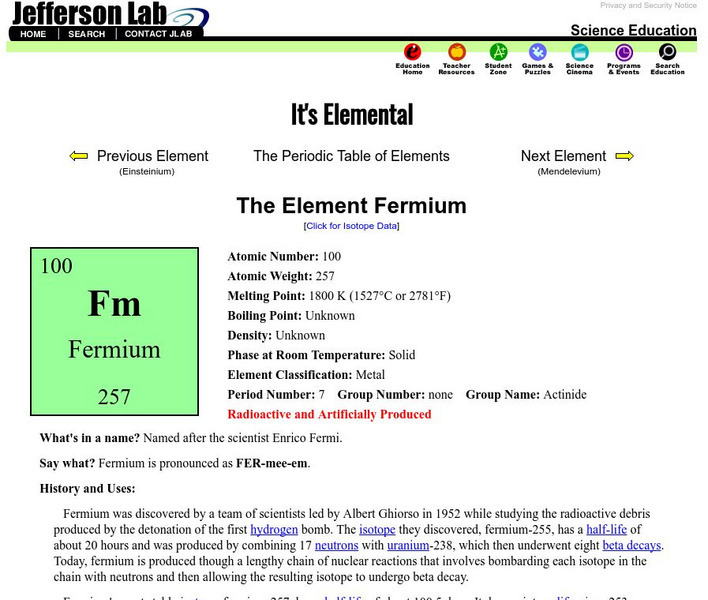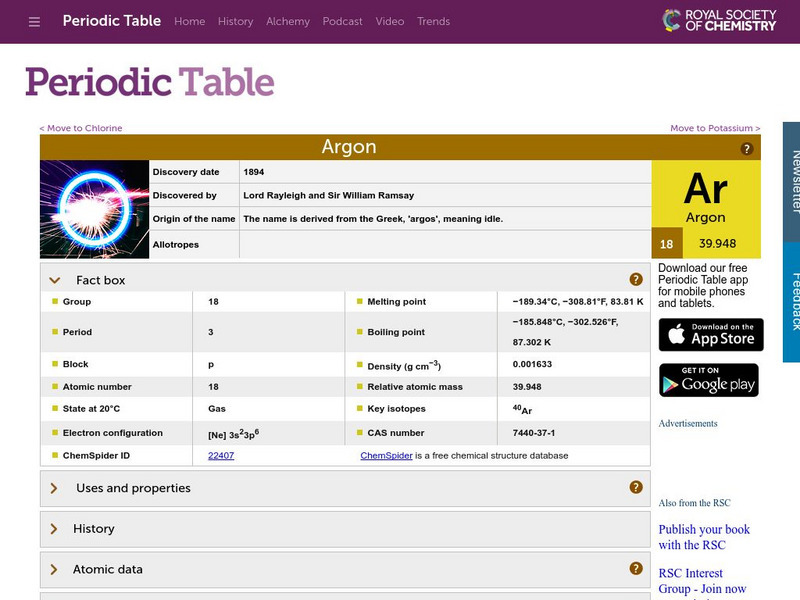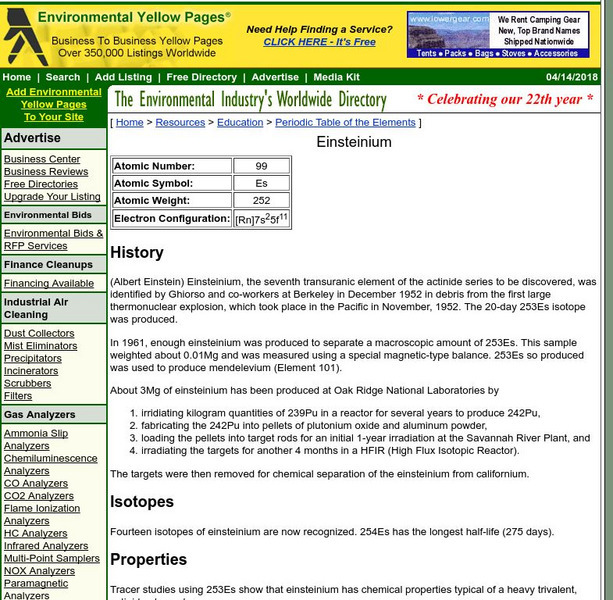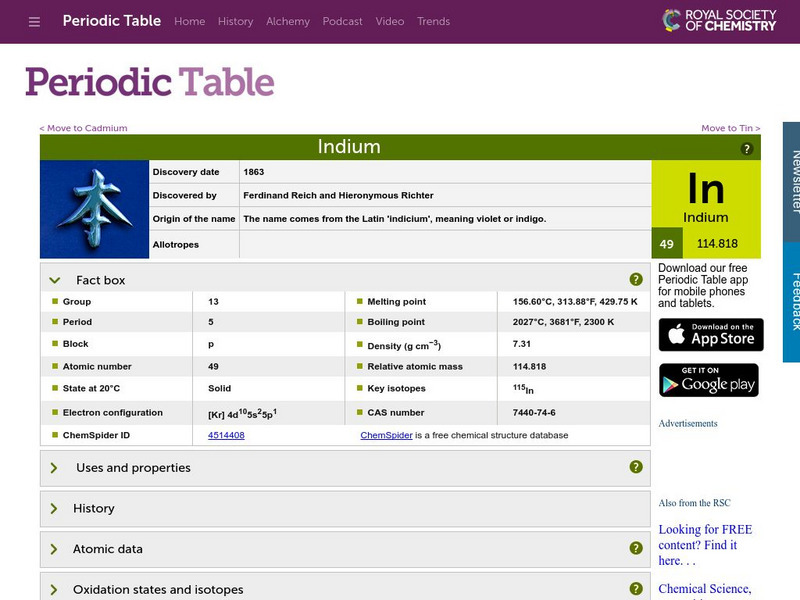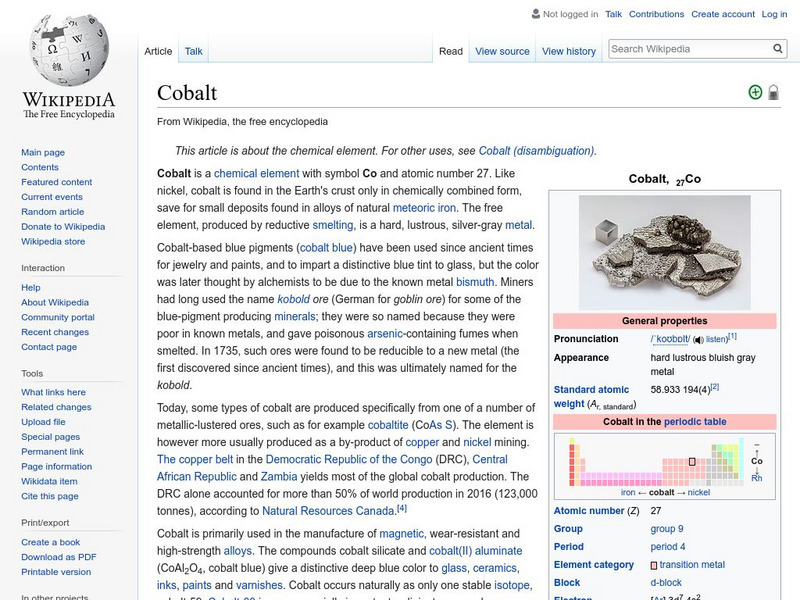Thomas Jefferson National Accelerator Facility
Jefferson Lab: The Element Fermium
A description of the chemical element Fermium. Gives scientific information such as atomic weight and atomic number, and also discusses its history and uses.
Khan Academy
Khan Academy: Threshold Card: Threshold 3 New Chemical Elements
An infograph that discusses how new chemicals were formed during the formation of the universe.
Sophia Learning
Sophia: History of the Periodic Table
A presentation which explains the historical development of the periodic table of elements.
Royal Society of Chemistry
Chemical Society: Argon
This site, which is provided for by the Chemical Society, gives a small amount of basic information on argon, including its history and uses.
Thomas Jefferson National Accelerator Facility
Jefferson Lab: It's Elemental the Element Francium
General information on the element Francium. Gives its history and uses along with periodic table information such as atomic weight and number, etc.
Other
Environmental Yellow Pages: Elemental Einsteinium
The history, isotopes, and properties of the element Einsteinium are discussed on this site. Also listed is the atomic weight, atomic number, atomic symbol, and electron configuration.
Florida-Spectrum Environmental Services
Florida Spectrum: Chemical Fact Sheet: Oxygen
Very thorough summary of detailed information on oxygen, its history, isotopes, properties, and applications.
CK-12 Foundation
Ck 12: History of the Periodic Table
[Free Registration/Login may be required to access all resource tools.] In this online tutorial students will begin to explain the use of chemical and physical properties in the historical development of the Periodic Table. They will be...
Florida-Spectrum Environmental Services
Florida Spectrum: Chemical Fact Sheet: Neon
Detailed information on neon, its properties, history and uses. A good resource for this element.
Khan Academy
Khan Academy: Infographic: Chemical Abundances: The Universe
An infograph showing you what chemicals are found in our universe.
Khan Academy
Khan Academy: Infographic: Chemical Abundances: A Meteorite
Examine the chemical composition of a meteorite, identify elements and their abundances in meteorites, and take an in-depth look at iridium with this downloadable infographic.
Khan Academy
Khan Academy: Infographic: Chemical Abundances: Human Body
Almost 99% of the mass of the human body is made up of six elements: oxygen, carbon, hydrogen, nitrogen, calcium, and phosphorus. View this downloadable infographic on the human body.
Royal Society of Chemistry
Chemical Society: Indium
Brief information about indium, focussing on history, properties and uses.
Wikimedia
Wikipedia: Cobalt
This Wikipedia online encyclopedia site provides information on the element Cobalt (Co). Entry includes the characteristics, history, biological role, occurrence, compounds, isotopes, and more about Cobalt.
Georgia Department of Education
Ga Virtual Learning: Ap Chemistry: Atomic Theory
In this module students explore how matter is classified, the history of atomic theory, subatomic particles, modern atomic theory, electron configuration, the periodic table and its trends, and spectroscopy.
Wikimedia
Wikipedia: Strontium
Wikipedia offers detailed information on the chemical element, Strontium, including notable characteristics, applications, history, occurrence, isotopes, precautions, and more.
Khan Academy
Khan Academy: Activity: Is It in There?
Can you connect our daily lives to dying start? In this lesson, students will find connections between elements found in the world around us today and chemical elements in dying stars.
US Geological Survey
Usgs: Arsenic in Ground Water in the United States
This page discusses the presence of arsenic (chemical symbol As) in ground water in the United States. Also provides many links to other sites about arsenic (especially in drinking water.)
Florida-Spectrum Environmental Services
Florida Spectrum: Chemical Fact Sheet: Carbon
Summary of the uses, history, properties, proper disposal, and environmental fate of the various forms of carbon. The various allotropes of carbon are described in detail.
